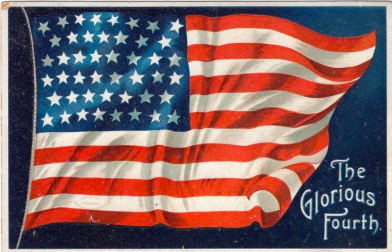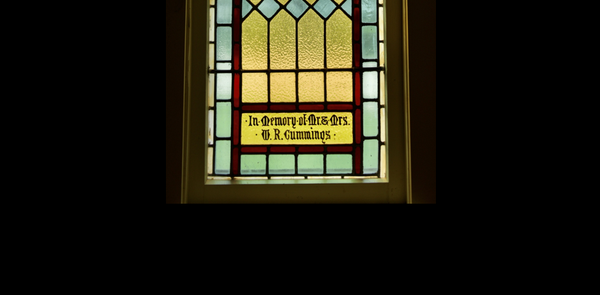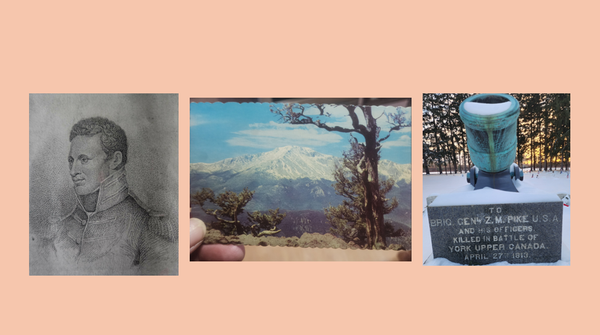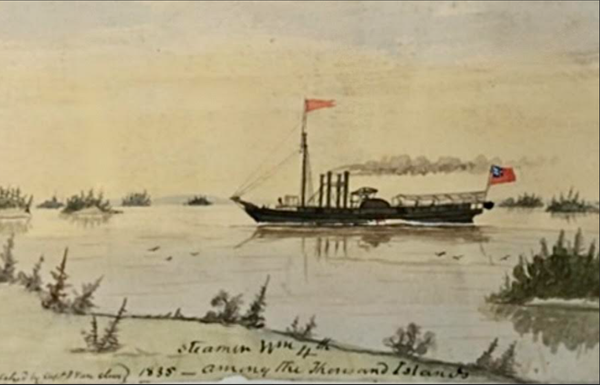The Glorious Fourth of Yesteryear
by: Lynn E. McElfresh
Salutes
Citizens jump-started the Glorious Fourth celebration at the stroke of midnight by the ringing of cowbells, banging of tin pans, and blowing of horns. I especially liked this description from a Watertown paper: “The younger population of the town left no horn un-blowed, no drum un-beaten, and no firecracker un-cracked to show their innate patriotism. So vigilant and so careful were they to mind the old adage, ‘The early bird catches the worm,’ that they started on their raids on the last stroke of 12 o’clock p.m. of July 3rd. Sleep was not to be thought of for the racket and hideous noises.”
In 1878, the Fishers Landing artillery started the day with a 101-gun salute at sunrise. Up and down the River, other villages and towns fired guns big and small. Some started with a 13-gun salute at sunrise---for the 13 original states I assume—followed with a 38-gun salute at noon, which represented the current 38 states. Other towns ended the day with a gun salute at sunset. Some did all three!
Land Events
Orations
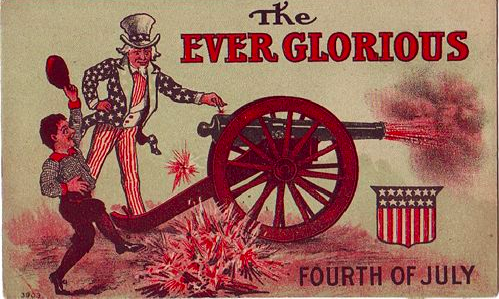
Parades and Processions
Mid-morning there was sometimes a parade. Watertown advertised its Independence Day Grand Parade like this: “At half past ten a procession will form at the engine-house, headed by the mayor and common council, firemen’s band, firemen in uniform and the Grand Army Men.” Lacking a fire department and army guys, towns along the River had a “parade of the terribles,” a parade of people wearing comic and grotesque costumes, of which a Watertown paper reported: “was the source of considerable amusement.”
Baseball Games It seems every town along the River could scrape together nine men to form a baseball team. In the 1890s, many of the island resorts had teams and there would be reports of Thousand Island Park competing with Round Island Park. Even tiny Grenell Island Park had a baseball team.
Other Athletics included: Sack Races, Foot Races, Bicycle Races, Wheelbarrow Races, Greased Pig Contests, Potato Races, Wrestling Matches and a Pie Eating Contest!
Most the events are self-explanatory, although some might not be old enough to remember Sack Racing. Contestants step into a burlap potato sack and at the shout of “GO!” hop to the finish line. Even if you remember sack races from your youth, you might not know that the Sack Race was an Olympic event in 1904. And there might be city-folk out there who haven’t heard of a Greased Pig Contest, where contestants gather in a confined pen and the first who catches and holds onto the greased pig wins.
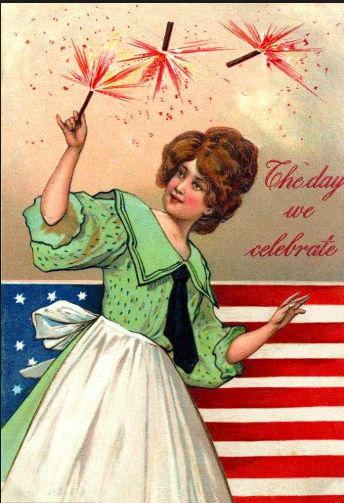
Water Events
Events included:
Swimming Races. Swimming races were for men and boys only, of course.
Sailing Yacht Races. In 1878, the Independence Day Sailing Yacht Race in Clayton had 12 entries which sailed a 12-mile course. Unfortunately, there was not much wind on that day and it took the winner, a sailing yacht named Victorine, 3 hours, 18 minutes and 15 seconds to complete the course. A dismal sub-4 mph pace!
Steam Yacht Races back in the 1880s, this race was often between the Junita, captained by M. C. Rogers and the Needle Gun captained by “Captain Jack” Taylor. In 1887, this race was ten and one-half miles and only took 45 minutes and 25 seconds to complete. The newspaper described it as thus: “The contestants put on all steam and flew away toward the turning point, 3 ½ miles up the River. The Junita steadily gained on the Needle Gun and soon steamed past her; meantime the anxious multitude awaited their return, and in just 45 minutes from starting, the Junita passed the judges stand, amid deafening cheers from the vast crowd of spectators. Needle Gun came in three minutes behind, making the trip in 48 minutes.”
Skiff and Sailing Skiff Races
Most skiff races were one mile in length. I was surprised to read that there was a race for gentlemen and another for ladies. I was even more surprised that the prize for the gentlemen was only $1, but the winner of the Ladies Skiff Race received $2.
Skiff Tug of War Race. This was not described. The newspaper account only said that the oar broke in one of the skiffs, so the Tug of War Race would be rowed again. I can only imagine that two skiffs are tied together by a rope and are rowed in opposite directions trying to pull the skiff over a line.
Blind Punt Race. Participants were blind-folded before they attempted to row the race course. One newspaper reported: “The blind punt race was won by Rob Dingman, four or five of the boats getting mixed up and all going in different directions.”
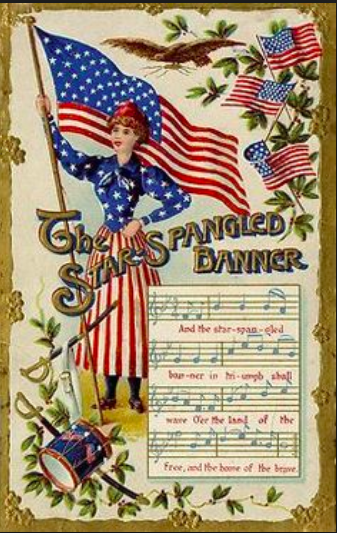
Greased Pole Over Water. I’ve heard of greased pole contests but had always envisioned some poor guy trying to shimmy up a metal flagpole. Boy was I ever wrong! The pole was more like a square timber angled up from the shore about 10 to 12 feet over the surface of the water. Flags were attached at the end of the pole and then slathered with lard. Contestants would walk or the braver contestants would run down the length of the “pole” and attempt to grab a flag before slipping off into the water, hopefully without cracking their head or other tender parts on the pole.
Some events weren’t explained but sounded very interesting. If anyone knows what a Tip-Over Race or a Slow Horse Race is…please enlighten me.
Music & Dancing
There were no earbuds, boom boxes or satellite radio back in the 1870s. All music was live and loud! Each town had a band and usually a bandstand in the park. And on the Glorious Fourth in the Gilded Age, there was plenty of music during the day and dancing at night.
At Fishers Landing in 1878, there was not one, but three bands playing throughout the day. First, the Clayton Band “in handsome uniform enlivened the proceedings.” And, later in the afternoon, the 15-piece LaFargeville Cornet Band filled the air with patriotic music. I’m guessing plenty of John Phillip Sousa marches. That night there was a Fourth Hop at the Grand Central Hotel owned by Mr. Newton. The Watertown Reunion reported that: “For the accommodation of those who like to trip the light fantastic toe, Mr. Newton has, at a large expense, erected one of the finest dancing platforms in Northern New York. It is fifty feet square and entirely covered with canvas.” The article went on to say, “the music will be furnished by an efficient Orchestra, the Thousand Islands Quadrille Band having been engaged for the occasion, thus affording a rare opportunity for the boys to bring their best girls and have a good time.”
Sing-a-longs were also popular in this time period. Before any cottages were built on Bluff Island, the namesake bluff at the foot of the island was a popular place for islanders to go and sing patriotic songs. How this tradition was started, I do not know, but belting-out the Star-Spangled Banner on Independence Day continued until the land was purchased and built on.
Food
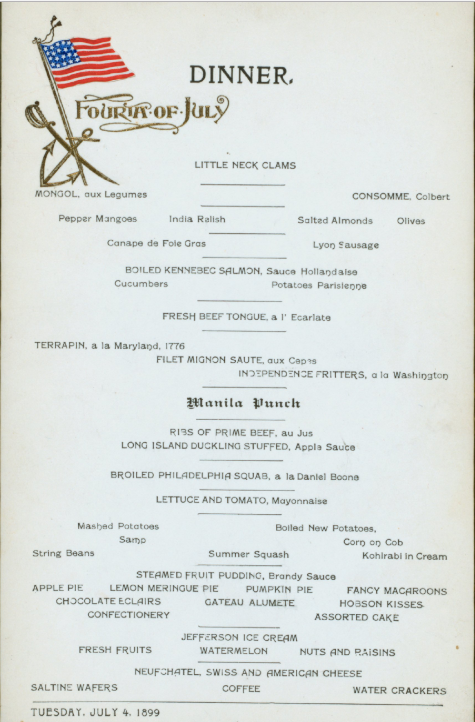
From the Indianapolis Journal, I found this quote: “An old-fashioned Fourth of July barbecue—something that the present generation never witnessed—is advertised by the Chylor Brothers, to take place at the State Fair-grounds. A 1,600-pound ox and numerous fine fat sheep are to be served up free…”
I loved the recipe for Independence Cake, which I found in Jennie June’s American Cookery Book, published in 1870. “Twenty pounds of flour, fifteen pounds of sugar, ten pounds of butter, four dozen eggs, one quart of wine, one quart of brandy, one ounce of nutmegs, three ounces each of cinnamon, cloves, and mace, two pounds of citron, five pounds each of currants and raisins, and one quart of yeast.” Jennie June only lists the ingredients. There were no instructions on how the ingredients should be mixed or what sort of oven or pan could hold almost 70 pounds of batter. After the list of the ingredients, Jennie June only adds: “Frost it, and dress it with box [leaf] and rose leaf.”
Fireworks!
The biggest similarity between the Glorious Fourth of yesteryear and July 4th of 2018, is the evening fireworks display. A Watertown paper reported: “Eugene Robinson’s beautiful island and residence were brilliantly illuminated, and one of the handsomest displayers of fireworks ever given on the River was enjoyed by many people.” Eugene Robinson was a Wall Street broker, who owned Isle of Pines near Fishers Landing. Mr. Robinson served on the Glorious Fourth Celebration Committee for Fishers Landing that year.
So, there you have it—the Glorious Fourth from nearly 150 years ago. Much has changed, but the spirit and fireworks live on!
By Lynn E. McElfresh, Grenell Island
Lynn McElfresh has written 114 articles for TI Life. This month when we celebrate Independence Day on July 4th, she take us back to the early years, sharing some wonderful patriotic post cards. Islanders then seem to have just as many fireworks and community celebrations.
Lynn often writes about her favorite Grenell Island and island life. We have learned a great deal over the years from her musings, from moving pianos to island weddings, or from plumbing problems to meeting old friends and taking nature walks. Back in June 2013, she introduced us to Grenell Aglow – remembering when island residents decorated their homes for passing boaters. To see all of Lynn’s island experiences, search TI Life under Lynn E. McElfresh.
Comments (Taken from the old TI Life site)
Comment by: Ray
Left at: 8:35 PM Saturday, July 14, 2018
Comment by: Kelly Dixon
Left at: 5:20 AM Sunday, July 15, 2018
Loved the story!! Thanks for sharing it!
Comment by: Lynda
Left at: 5:41 AM Sunday, July 15, 2018
What a interesting read!
Hooray for the red, white and blue"!
Comment by: Liz Aldridge
Left at: 4:04 AM Friday, July 27, 2018
Lynn, your articles are always a joy to read. Does a “tip over race” possibly involve cow tipping?
Comment by: Brigitte
Left at: 2:07 PM Wednesday, August 29, 2018
Great article. I will guess that a tip over race is how many people can get onto boats/rafts before tipping over.

